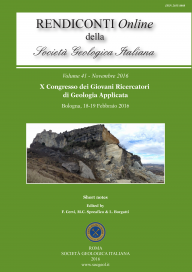
Groundwater Heat Pump System: behavior and relationships between the groundwater temperature and electrical conductivity
Glenda Taddia (a), Elena Cerino Abdin (a) & Stefano Lo Russo (a)
(a) Dipartimento di Ingegneria dell'Ambiente, del Territorio e delle Infrastrutture, Politecnico di Torino, e-mail: glenda.taddia@polito.it
Volume: 41/2016
Pages: 292-295
Abstract
The use of groundwater abstracted via open loop systems is increasingly being considered as a means to provide heating and cooling for buildings in urban contest. Physical processes affecting heat transport within an aquifer include advection (or convection) and hydrodynamic thermodispersion (diffusion and mechanical dispersion). The advective components tend to dominate the heat transfer process within the aquifer and the diffusion can be considered negligible. This study illustrates the experimental results derived from the groundwater monitoring in the surrounding area of an injection well connected to an open-loop GWHP plant which has been installed in the "Politecnico di Torino" (NW Italy) for cooling some of the university buildings. Groundwater pumping and injection interfere only with the upper unconfined aquifer. The data deriving from multiparameter probes installed inside the pumping well (P2), the injection well (P4) and a downgradient piezometer (S2), refers to the summer 2015. Monitoring of hydraulic levels, electrical conductivity EC and temperature T in P2, P4 and S2. The experimental results demonstrated the propagation of the subsurface thermal plume during the injection of warm water and the progressive disappearance of the temperature anomaly with time. Another important aspect that we will investigate is the unusual trend of EC values during the year and the possibility cross-correlation between EC values and T values. In particular we intend to continue this analysis to verify the reason of this data anomaly.
Keywords
Get Full Text